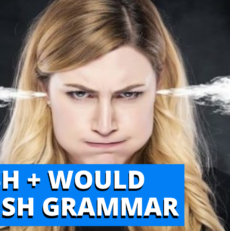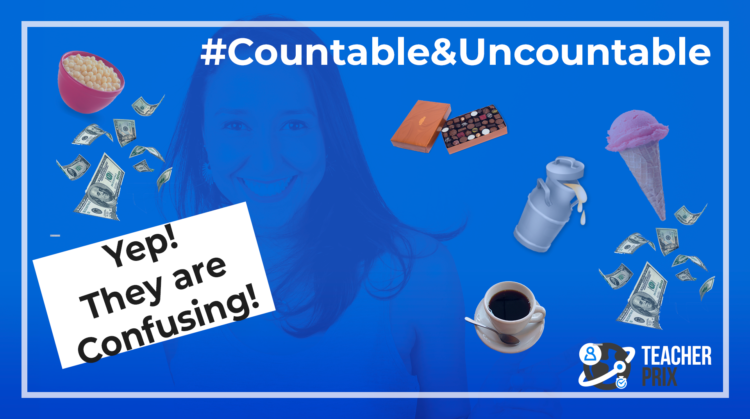
May 15, 2021
How to use Wish in English – Learn English Grammar

What are countable and uncountable nouns?
Hey, friends! How are things?
Countable and Uncountable nouns always confuse students. There are so many posts and vídeos out there! However, it is an important subject, which is why I am creating my post to help you with this subject.
by the way, if you want exclusive tips and vídeos to help you improve your English even more, sign up for my newsletter and receive weekly FREE content and a free ebook. Click on the top right of this page and you will the newsletter sign up option.
Let’s start with the basics…
It is important to review this information because many students forget what a “noun” is. Basically, a noun is a word that can describe a place, a person or a thing. When we talk about countable and uncountable nouns, this is the word we are going to change (or not)
This is the easiest one. Countable nouns are words that you can count for example 1 apple, 2 apples, 10 boxes. These words can be used in the singular and in the plural.
If a countable noun is in the singular, you will always need to use the articles A/AN. I want an apple. I have A car.
Uncountable nouns, on the other hand, are a little bit more confusing. WHy? Because we can NOT count them. For example money, water, information, advice.
But teacher, I CAN count money!! 10, 50, 60.
NO! You can count the value, not really the concept of money. The same thing happens to the word water. You cannot count the water, BUT you can COUNT the MILLIMETERS of water.
Information and advice can not be counted either.
If you want to give a PLURAL IDEA to an UNCOUNTABLE noun, it is possible!! You can use words to help give this idea. Here are some words you can use.
These words will help you “quantify” the uncountable noun. They don’t give an exact number, ok? Here are some examples
Can I have some water? (I don’t know the exact amount of water, but the word “some” will help me quantify the word water)
Would you like a piece of bread? (you can not say “one bread”, it is wrong. However, you can say one piece of bread.
A little is the opposite of much. Much and a little are used with uncountable nouns.
I don’t have much time. I have a little time
I don’t have a lot of time (much time) OR I don’t have lots of time (much time)
Just like the uncountable nouns, there are words you can use to help you “quantify” countable nouns. Here are some examples
Some, a few, many, a lot of, lots of
As you can see, some words can be used with both countable and uncountable nouns (some, a lot of and lots of).
I have some friends (I don’t exactly how many, but I know it is more than one).
I have a few friends (a few/few is the opposite of many)
I have many friends = I have lots of friends = I have a lot of friends (many, a lot of and lots have the same idea)
Any is also a word that can be used before countable and uncountable nouns. I have an entire post talking about any and some, but basically, you will use “any” in negative and interrogative sentences. If you want to learn more about any, check out my post.
Do you have any friends?(I want to know if you have one or more friends, I don’t have an exact number) Yes, I have some friends. No, I don’t have ANY friends (If you use any in the negative form, it means zero 0)
Some words can be both countable and uncountable nouns, but the meaning will be different
For example some ice cream and an ice cream.


Nice! This is the first countable and uncountable nouns post. I will prepare more of them! Now, how about an exercise?
A. Write C or U (countable or Uncountable) or B (if it is BOTH options)
B. Complete the sentences with the right complements (a few, many, much, some, a little, any)
Share this post with your friends
Teacher Prix
Leave a Reply